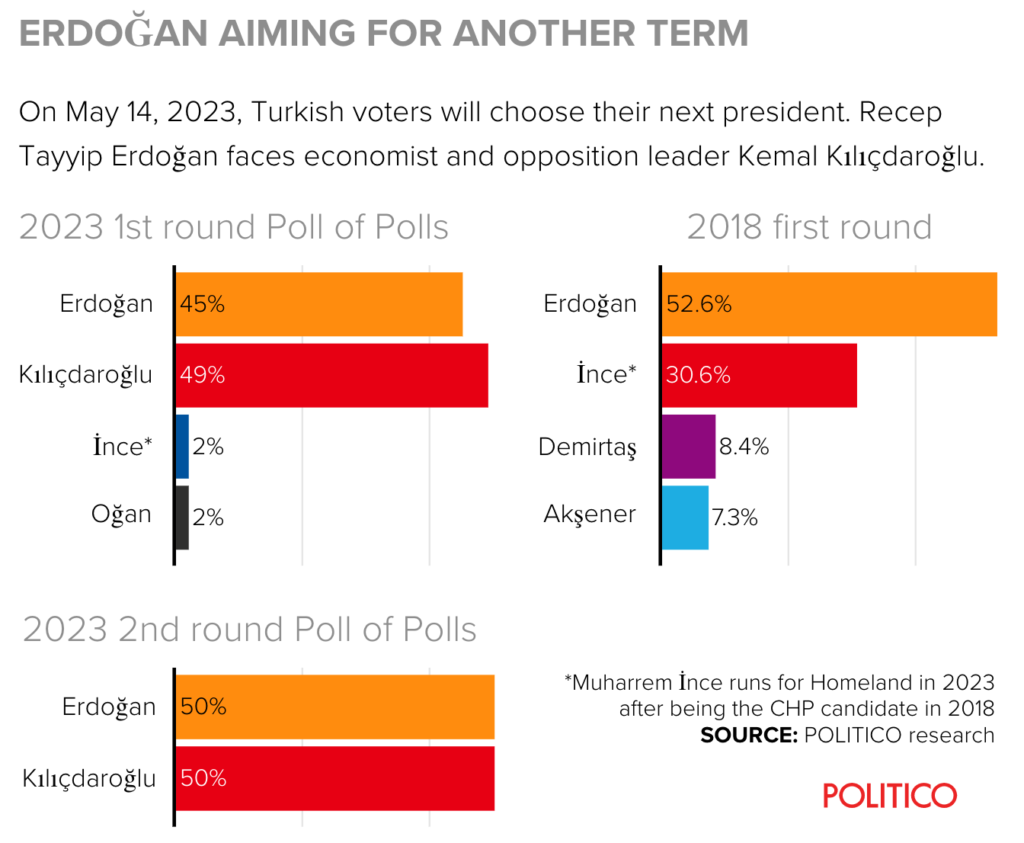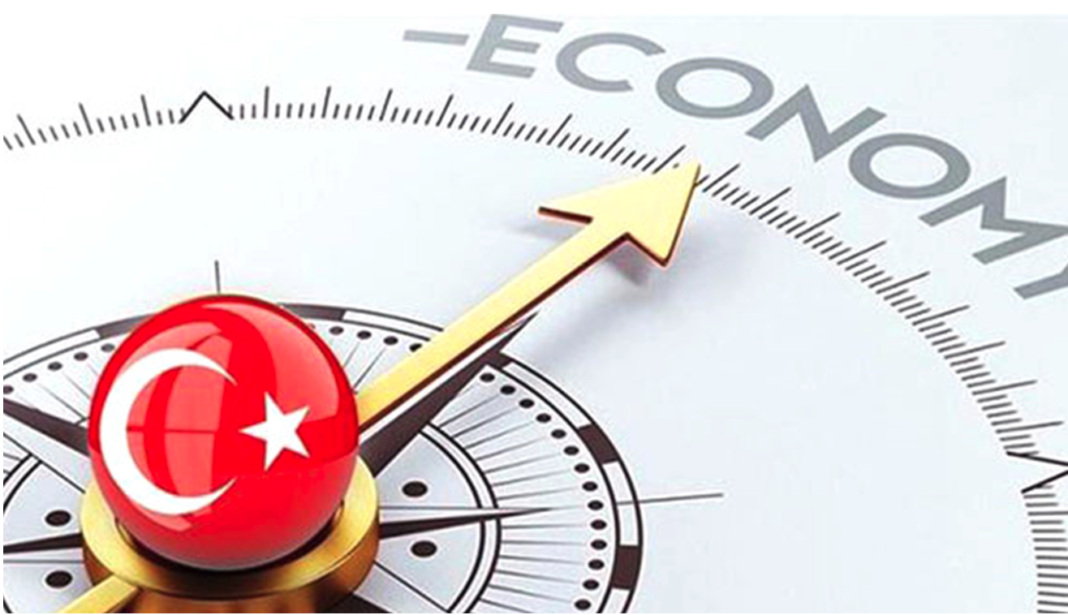Taming runaway inflation will be vital, but that could mean eye-watering interest rates, perhaps as high as 30 percent. By Elçin Poyrazlar in Politico on May 4, 2023.
Don’t envy whoever wins Turkey’s election this month. The victor could immediately be blown off course by strong economic headwinds.
In the first decade of his 20-year rule, Recep Tayyip Erdoğan rode an economic boom — driven in part by manufacturers and exporters from conservative Anatolian heartlands that supported his ruling AK Party — turning Turkey into one of the buzzing emerging markets to watch. Robust growth — averaging more than 7 percent annually between 2002 and 2007 — was once Erdoğan’s proudest boast.
Over the second decade of his rule, the story was exactly the opposite, as the president took absolute control over monetary policy and insisted on his unorthodox theory that high interest rates cause inflation. Prices raged out of control and debates over the cost of staples, from onions to cucumbers, have figured prominently in the run-up to the May 14 election.
The data paints a grim picture of turbulence. According to the Turkish Statistical Institute, the country’s annual inflation stood at just under 44 percent for April, although ENAGrup, an independent research organization, estimated that the real rate was more than twice as high, at 105 percent. Ten years ago, in May 2013, a dollar was worth less than two Turkish lira. Today it buys almost 20. If only to add fuel to the fire, the reconstruction bill for this year’s devastating earthquake will total tens of billions of dollars.
Both sides know the priority after the vote will be to try to staunch the bleeding and turn Turkey back into a desirable destination for all-important foreign investment.
“Whoever comes to power, the main issue will be the economy and it is going to be a tough first six months,” said Uğur Gürses, a former central bank official and finance expert.
Putting the experts back in charge
Erdoğan has offered some indication he is willing to take a new tack after the election by saying in April he was seeking to assemble a team under former economy chief Mehmet Şimşek, an orthodox economist who was a darling of investors during the earlier part of the government’s rule.
Şimşek himself has turned down Erdoğan’s offer to be in his Cabinet by responding that he is not looking for a return to an active political role.
Most economists are concerned about the talent pool that Erdoğan can draw on, and worry that his post-victory recipe would simply be more of the same.
Erol Taymaz, professor of economics at Middle East Technical University in Ankara, said he doubted a new Erdoğan administration would « have the knowledgeable and skilled personnel who can solve these problems with the least cost. »
« There is no indication that the new government will abandon its current practices that led to growth and distribution problems. The current overly-centralized governance structure also reinforces these problems. It is not meaningful to do the same thing and expect a different outcome.”
Victory for the president in May’s election definitely carries risks for the country’s economic fortunes, but even if the opposition alliance triumphs, it too will be hard pressed.
Selva Demiralp, professor of economics at Koç University in Istanbul and a former economist at the Federal Reserve Board, reckons that in the case of a victory by the opposition — which has signaled a return to more orthodox economics — interest rates may have to exceed 30 percent to combat inflation. That would be a huge jump from the current rate of 8.5 percent.
She added that just how high rates will go depends on « how quickly the new team gains credibility, its communication power, how stubborn inflation expectations are, and the pressures on the exchange rate.”
Sky-high rates would be a tough pill to swallow for any new government as, although they should tame inflation, they would also be likely to crimp business.
Demiralp argued a key challenge for a new government will be to “establish trust, both domestically and internationally” to give the economy some room to maneuver and attract more foreign funding to finance the economy without stoking inflation.
The six-party coalition challenging Erdoğan has an economic team that includes experts such as former AK Party economic supremo — and Şimşek’s former boss — Ali Babacan, as well as Bilge Yılmaz, a professor at the Wharton School in Philadelphia, and advisers to the main opposition party CHP such as former chief economist of the Turkish central bank Hakan Kara, American economist Jeremy Rifkin and Daron Acemoğlu, a renowned MIT economist.
No time for half measures
The Turkish economy still has major selling points — including strong manufacturing industries ranging from cars to clothes, a customs union deal with the EU and an ideal geographical location to supply markets in Europe, the Middle East and beyond.
Taymaz said even though the current problems are significant, the Turkish economy is highly resilient and flexible and short-term problems can be solved relatively quickly. The professor also stressed that the most important step after securing stability would be to « implement industrial and technology policies. »

Murat Üçer, a former adviser to the Turkish central bank now at GlobalSource Partners, told POLITICO that Turkey needed a comprehensive stabilization and disinflation program, and a victorious opposition could not afford to be overly cautious in rolling it out.
“With the opposition taking hold of both the presidency and parliament somehow, this can happen, but there are risks even then … The opposition will have to assemble a very credible economic team as soon as possible, which will need to work swiftly and cohesively. Another risk is opting for too much gradualism or not being bold enough, in the calibration of monetary-fiscal policy,” Üçer said.
Maintaining political stability in a diverse six-party coalition might prove to be the opposition’s biggest challenge.
“The new government will face difficult dilemmas, and it must also bear in mind that there will be local elections in 2024,” Taymaz said.
Üçer said he was optimistic about a return to more traditional economics under an opposition government, “which could mean weaker growth but a markedly improved outlook, in terms of feel-good factor”
But he added: “A screw up, like internal bickering, not looking cohesive, being too gradualist, and not attracting enough inflows is a risk — if this opportunity is missed, then [Erdoğan’s] AK Party could come back. »

